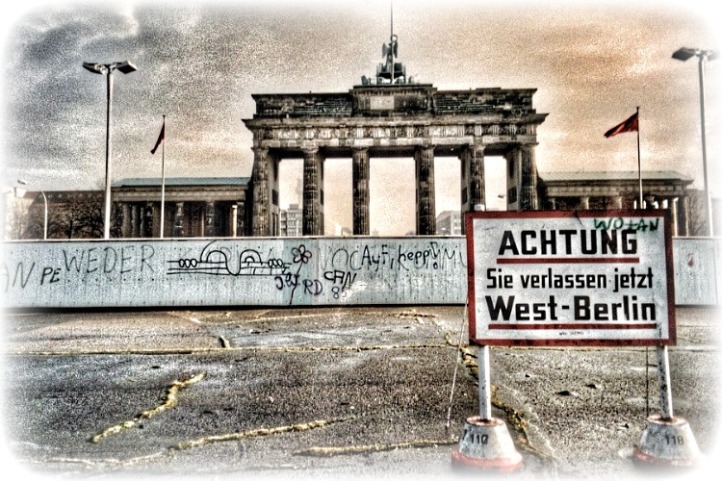
If you follow our blog you will know that we absolutely love going on classic train journeys. We have been lucky enough to experience incredible train trips all over the world but none of them match up historically or emotionally to one we took a few years ago in Cold War divided Germany.
Background to the Cold War and Germany
To set the scene I’ll need to explain the historical situation in Germany in the mid 1980s. The Cold War between the Soviet Union and the Western Allies had split Germany in half with a border running north to south all the way from the Baltic to Czechoslovakia. Two countries were formed due to this border, West Germany (allied to France, UK, and other western nations) and East Germany (controlled by the Soviet Union). The historical capital of Germany, Berlin, was right in the middle of East Germany.
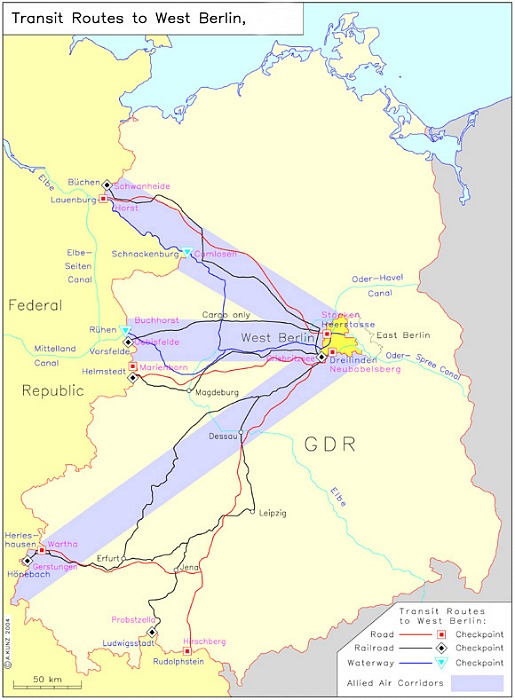
At the end of the Second World War Berlin had been divided into 4 zones, under the control of the four victorious allied nations (France, UK, Soviet Union, and USA) and by 1960 the three western zones had amalgamated into one. So Berlin was split in half with West Berlin effectively being an island in the middle of the Soviet controlled East Germany.
As part of the post-war occupation an agreement was made to guarantee transit links from West Germany into West Berlin. Several road and rail links (as shown in the above map) were set up.
Did you know? The term ‘Cold War’ was first used in relation to the post-WWII political climate by English author George Orwell in his essay ‘You and the Atomic Bomb‘ published in October 1945.
The British Forces had an agreement to run a single train each day in each direction across occupied East Germany. This was the train that we decided we would like to take!
At the time I was in the Royal Air Force at RAF Laarbruch near Dusseldorf so a four hour car journey via Duisburg, Dortmund, Bielefield, and Hannover took us to the town of Helmstedt right on the East/West border. This was where we would pick up the military train bound for West Berlin.
The Berliner
The train was called ‘The Berliner‘ and between 1945 and 1990 it ran through Soviet occupied East Germany into West Berlin. The journey from Helmstedt station, where all the doors were locked and armed guards occupied the train, took approximately 4 hours covering 145 miles. It ran every single day of the year with no exceptions.
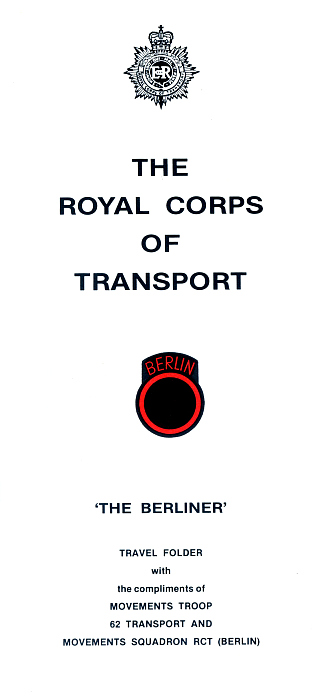
As we joined the train at Helmstedt we had our papers checked by military staff, double-checked in fact, before boarding. Within minutes the train left as we found our pre-booked seats before it then stopped right on the actual border. This was before the times of automatically locking doors so every door was then locked from the outside by armed Soviet staff and a succession of photos taken from the outside of as many passengers as possible before we headed off. Quite intimidating. We had been briefed before leaving not to look at the camera-yielding Soviets or to communicate in any way at all.
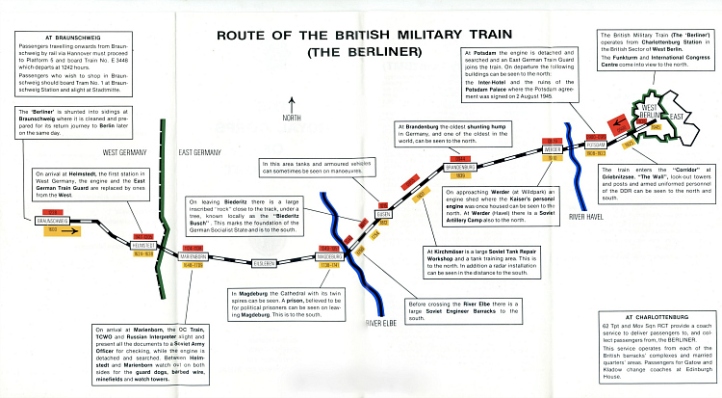
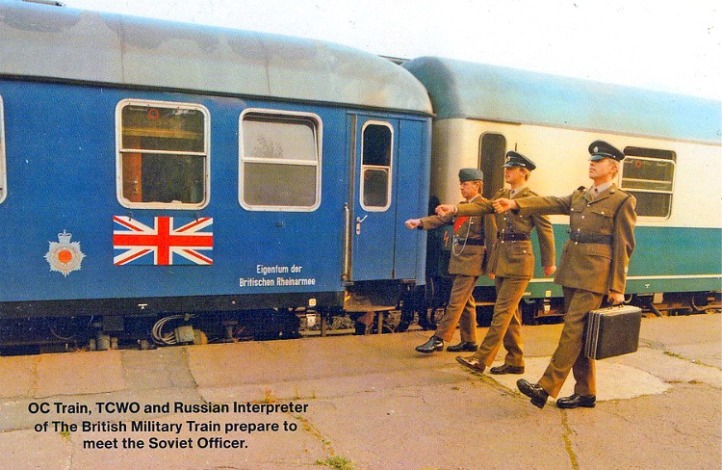
Travelling through East Germany
Immediately we noticed the difference between the lush fairly prosperous West and the Communist-run East. Buildings were more run-down, rail-side signs in bad states of repair, and most obviously the cars at level crossings seemed to be from another age. Twenty and thirty year old Trabants lined the streets in terrible condition and driven by what looked like poorly-dressed, poorly-fed locals but these were the rich families, wealthy enough to own and run a car.
Part of our ticket included dinner in the dining car and as we took our seats to be waited on by the Army waiting staff we felt extremely conscious of the huge difference between the ‘westerners’ on the train eating steak and drinking wine, and the ‘easterners’ outside looking in living in poverty. Not a comfortable experience at all although some of our fellow diners didn’t seem at all bothered.
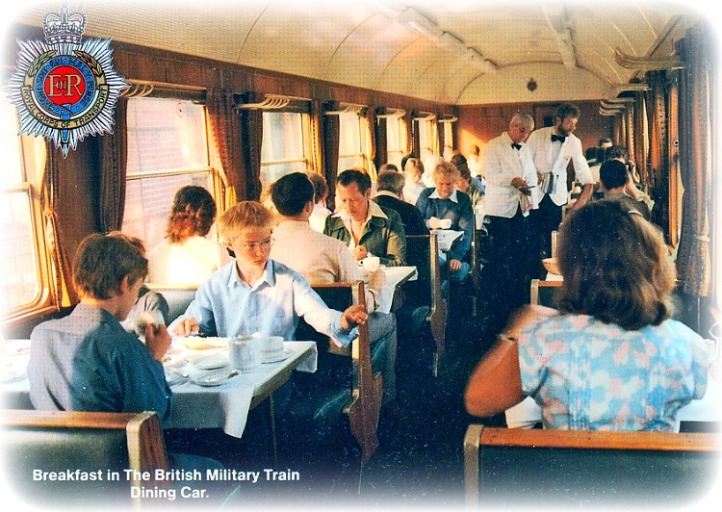
Back in our standard seats we found the whole journey absolutely fascinating as the train passed through Magdeburg, Brandenburg and Potsdam. To see at first hand the obvious differences between how people in the East lived and what their world looked like was both interesting and deeply upsetting.
Obviously being part of the military and having been brought up during the Cold War we knew the history and background of the whole Germany situation but it wasn’t until we were racing through the countryside actually looking out on their country that we started to appreciate the real sacrifices and hardships that were being encountered.
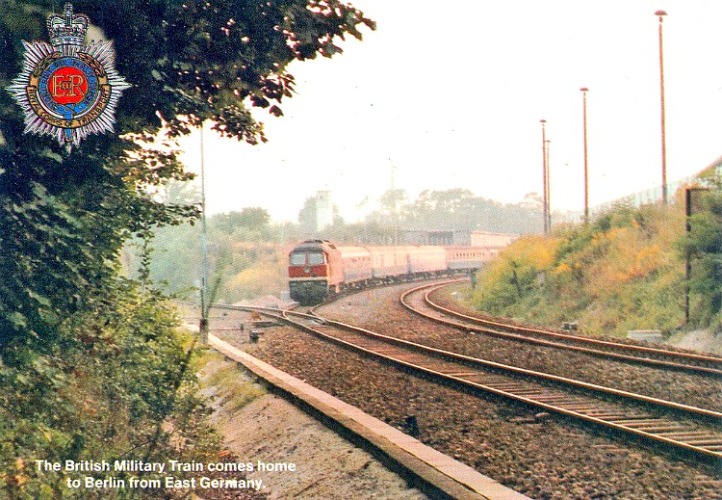
Entering West Berlin
All too soon we were approaching the border with West Berlin where the train again stopped with the doors being unlocked and various military personnel disembarking and boarding. More document-checks and more photos through the windows before we headed the short distance into Charlottenburg station in West Berlin. Everyone has heard of the famous Checkpoint Charlie but the ‘Berliner‘ checkpoint was equally as important.
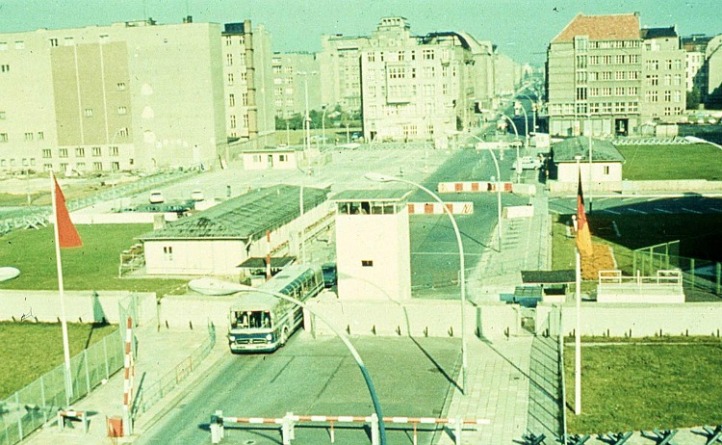
Disembarking into a standard western-style station just made the whole East Germany trip seem even more surreal. It almost felt like we’d imagined the whole thing as the world returned to what we were used to and although we knew we’d be on the return trip a week later it proved very difficult to relate to anything we had seen.
Cold War train to Berlin
What an experience though. Within a few short years of our visit the Berlin Wall was ripped down and the borders removed as East and West Germany became one in the early 1990s returning Berlin to it’s historical state as the capital of the whole country. The military corridors disappeared into history and the ‘Berliner‘ train was mothballed being no longer necessary. On our return to Berlin years later the whole experience seemed like even more of a dream.
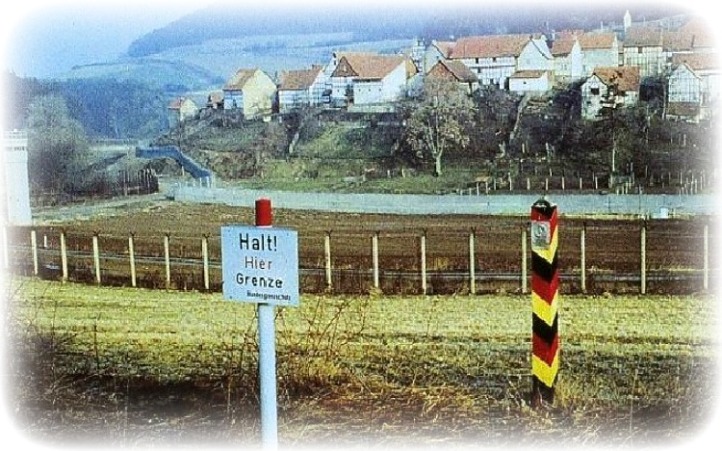
We wouldn’t have missed it for the world and will never forget the experience of travelling through a completely different world in a totally sealed train. Not sure this will ever happen again anywhere. A real moment in history.
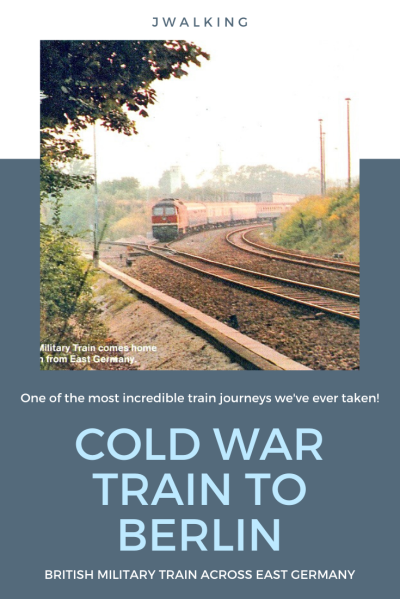


Amazing
LikeLiked by 1 person
It was truly incredible, a unique experience never to be repeated.
LikeLike
The trip sounds both daunting and confronting in many ways, but also fascinating to be part of history.
LikeLiked by 1 person
It was unbelievable really, especially as we look back. At the time we just accepted it and got on with it. A real moment.
LikeLike
I’ve been to Berlin and in fact Checkpoint Charlie a few years ago. Now its pretty much a tourist destination but there are still haunting echoes of the past. I would have loved to have been on that train back in the day
R
LikeLiked by 1 person
It was a once in a lifetime trip to be honest. Seems very strange now but at the time the Cold War was just normal so it wasn’t weird at all.
LikeLike
An interesting, heartfelt reflection – such a significant journey and memory
LikeLiked by 1 person
Thanks it really was a memorable trip and something we will never ever forget. Thanks so much for reading.
LikeLike
I was stationed in Berlin 1975 to 1977 I did numerous train guard duties and it was one of the best duties of the tour. Far better than guarding Rudolph Hess in Spandau prison. Went back there last year how the place has changed such a beautiful city now
LikeLiked by 1 person
Interesting and educational. Thanks.
LikeLiked by 1 person
It was absolutely incredible, an experience we will never forget.
LikeLike
What a trip that must have been. The differences between east and west were certainly stark!
LikeLiked by 1 person
They really were obvious differences, two worlds completely at odds with each other. So memorable.
LikeLiked by 1 person
I can imagine.
LikeLiked by 1 person
Really interesting, not sure I’d have enjoyed that experience but I would like to have had it. I didn’t go to Berlin till the early nineties when the differences between East and West were still quite stark. The second time we went – 2012 – the East seemed to me by far the most interesting part.
It’s hard to believe how long it now is since the wall came down. It and the terms Cold War and Iron Curtain seemed a part of life that would never change. Then they suddenly did. I take comfort from that and other events such as the ending of apartheid and the Good Friday Agreement. They suggest that everything passes eventually.
LikeLiked by 1 person
It seems crazy now doesn’t it? Almost like it never happened. We had only known a divided Germany so the wall coming down was just staggering.
LikeLiked by 1 person
What an experience, a living history experience. Not a train trip perhaps the average tourist might embark on then? Fascinating.
LikeLiked by 1 person
It was something completely different wasn’t it? We’ll never forget it.
LikeLiked by 1 person
A few years ago, I travelled through Berlin to Poland with work, we were setting up new education contacts with the recently opened up Eastern Europe. The wall had not long come down and East Berlin was a mixture of brand new flashy hotels with horse drawn trucks in the streets. Despite booking seats the trains were unpleasantly overcrowded, so my boss, a French woman and I choose to spend the return journey in the restaurant car. Our lack of German or Polish didn’t stop us ordering, and we, as we often did, spoke in a mixture of French and English. After a little while, a very refined elderly gent said in perfect English, ” ladies, I am intrigued, you behave like Polish ladies, yet speak a mixture of French and English, please satisfy my curiosity and tell me why you are visiting my country”. What followed was a lovely conversation about Poland, our work there, aided and abetted by, in good Polish fashion, quite a lot of sampling of spirits. At some point we asked how he had learnt to speak such good English. He told us he had never been to the UK, but had listened to the BBC on the radio. At the time, it would had to have been an illegal radio, and the punishments, if caught listening to Western “propaganda” would have been severe. It hadn’t stopped him. We were priviledged to meet him, to be able to converse so freely, and, today, to be able to travel across borders with relatively little impediment. It is said that travel broadens the mind. I think it does a whole lot more. It can certainly remind us of precious freedoms hard fought for. Here’s wishing you and yours a happy 2020, Sarah
LikeLiked by 1 person
What a great story Sarah, travelling is always about the people that you meet along the way. The differences between east and west we’re obviously still evident when you travelled even though the wall had come down. Have a great Christmas.
LikeLike
Fascinating stuff. Hard to believe 1 – that it ever existed and 2 – it’s been 30 years since it came down. Would John Le Carre have been quite as successful without it! I doubt too few recognised the importance of the Wall until it finally came down.
LikeLiked by 1 person
It’s still hard to believe that the Cold War was ever really a thing. Definitely seems like something from a fictional story.
LikeLike
Thanks for sharing. Hubby went through Checkpoint Charlie back in 1968 when visiting Berlin. You’ve got him trawling through his memory banks now, recovering from Xmas lunch, French champagne and muttering about armed guards. A dangerous combination.
LikeLiked by 1 person
Ha sounds like a great conversation is about to happen. Happy Christmas.
LikeLike
Cheers to you both!
LikeLiked by 1 person
Very interesting! Thanks!
LikeLiked by 1 person
It was an amazing experience, thanks so much for reading and commenting.
LikeLike
I really like your beautiful blog. A pleasure to come stroll on your pages. A great discovery and very interesting blog. I come back to visit you. Do not hesitate to visit my universe. A soon.
LikeLike
I traveled on the civilian service back in 1983. My lasting memory was of boarder guards in dugouts along the track and passing a number of tank parks full of Soviet battle tanks, everyone of them with their guns pointing West in a defiant act of propaganda.
LikeLiked by 1 person
That’s exactly what it was like, just seems like another world now though doesn’t it? Such a poignant trip at a fabulously interesting time in history. Thanks for reading.
LikeLike
I was with the US Army FSB in then West Berlin from 1981 to 1984 This article on the British train is really accurate, Been on the train several times. Also on the French train to Strasburg, France, and the USA trains to Frankfurt and Bremerhaven. Only other way to leave Berlin back then was by car along the autobahn or by air from Tegel Airport.
LikeLiked by 1 person
Amazing times weren’t they? Almost unbelievable now and a real moment in history. The train journey was unforgettable.
LikeLike
The doors that are locked from the outside, would have made me a bit uncomfortable 😉 … but it was such an interesting story to read, thanks!
LikeLiked by 1 person
We did feel locked in but I guess that was all part of the experience. An amazing journey that we’ll never forget.
LikeLiked by 1 person
The map of the Berliner talks about seeing the ruins of the Potsdam Palace where the 1945 Potsdam Conference took place. But surely that Conference took place in the Cecilienhof Palace which when I last visited (2007) was very much intact.
LikeLiked by 1 person
Sounds like you’ve discovered a mistake in the Berliner documentation then. Bit late to report it to anyone though I think.
LikeLike
Check out the Netflix film “I Kill Giants” part of the story centres round a railway “graveyard” which has some of the old Berliner coaches still with their Union Flag’s but sadly some seemed to be destroyed by fire as per the film.
LikeLiked by 1 person
Sounds worth a watch Ian, anything to do with Berlin and that period of history is well worth a look I think. Will check it out, thanks.
LikeLike